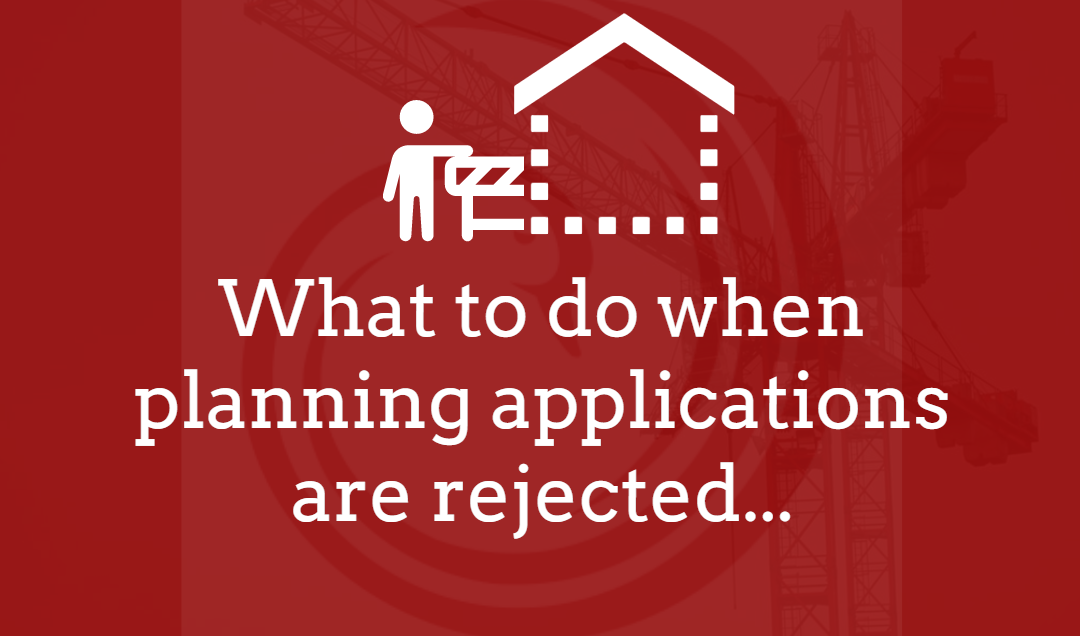After weeks and months of planning your extension or building project, you have done the homework only to be declined at the point of application… Urgh! What now? All good; here are some options:
Amend your plans throughout the application process
The application process is lengthy and during the process, your application will be submitted to your local authority for periodic consultation which can vary between three and eight weeks. Within that period, anyone who could be affected by your proposal will be consulted and any objections to your plans can be raised. Some objections/complaints submitted can be deemed irrelevant but this is where you are able to gauge the decision or outcome of their decision on your application.
Maintain regular contact with your planning officers where possible
If you’re made aware of any objections and you feel you might be able to amend the application in some way to help get the green light then bear in mind that these need to be changes the planning officer feels won’t need an entirely new application (small changes).a
It may also be possible to have the plans passed on the condition that you address whatever issue has come to light. If this happens, you will have to show the council, within whatever time frame is given, that you have made the necessary changes. Alternatively, the local planning authority may grant permission subject to conditions.
If you come to the conclusion that your application will be turned down, you still have options to save the process. You can either withdraw the application altogether and submit a new application or let the process reach the point of refusal and then you have the option to appeal…
Withdrawing and resubmitting another application…
If a solution is apparent, withdraw your application before it gets rejected, make the appropriate changes needed and then resubmit. Withdrawing and resubmitting your application is the top option if something has come to light which is likely to mean your application is likely to be rejected on planning grounds and you know how to resolve it. It shouldn’t cost you any money to resubmit (household applications pay a fee of £172* when you submit the initial application), provided you resubmit within 12 months and the overall outcome of the project is largely the same. Something to bear in mind is where you submit a valid application and then withdraw it at any time before it has been determined, the fee will not be refundable.
Appeal
If your planning application is declined and you feel the decision is unfair, you are able to appeal the decision. You must submit your appeal within three months (this deadline is for homeowners – developers with major projects have up to six months). If you are refused planning permission, start by speaking to the planning officer dealing with your case at the local planning authority for clarification.
Here are three ways of appealing:
- In writing.
- At an informal hearing.
- A public inquiry.
(You are normally only called for an informal hearing if there is a lot of public interest in the plans. A public inquiry will only be held in the most complex of cases.)
If you decide to appeal in writing, you will need to write down all of the reasons why you think your application should receive planning permission. Go into as much detail as possible. There will also be forms to complete which the council will send to you. It may help to get a planning consultant with knowledge of your local planning department on board to help with the appeal.
The council has to respond within six weeks of the submission of your appeal after then you have three weeks to comment on its response and any supporting evidence. (Bear in mind that anyone else impacted by your plans will also get the opportunity to comment.) A planning inspector will then visit your home and give his decision on the appeal within two to six weeks.
Appeals can take up to five months from the appeal submission to decision (but this can take longer if you go down the public inquiry route) and it’s only worth doing if you’re certain your proposal adheres to planning rules and you refuse to modify the plans to address any objections. On average only about one appeal in three are successful according to the Planning Inspectorate’s records. We do advise that if you can make amendments to get the application passed – and they won’t jeopardise your plans too much – it’s much more straightforward to do this.
If you do go ahead with the appeal and your application is still rejected, take on board the comments from the planning inspector. This can help you to make a new planning application that will hopefully get the “go ahead”.
We do hope this has helped you plan on your negotiation tactics. If you have a property to sell and would like to arrange a no obligation Valuation with one of us or would like further information, call us on 01932 22 21 20. Or join the Walton Property Community Group on Facebook or you can subscribe to our YouTube channel for free property advice, local property news and market updates.
If you want to find out the value of your property, you can get a free and instant valuation here.
Article sources: Homeowners Alliance & Land Registry.




